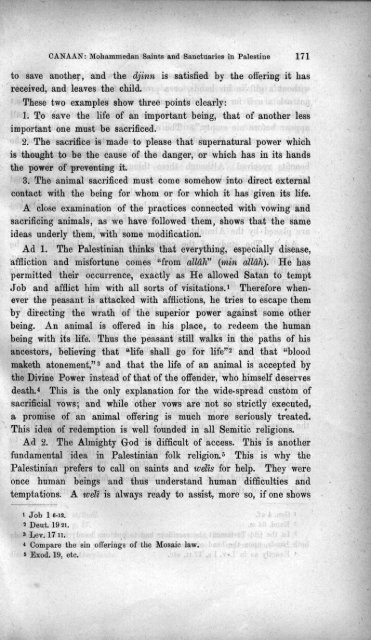- Page 3:
'JLu3ac's ~riental lReligionsSeries
- Page 7:
MOHAMMEDAN SAINTS AND SANCTUARIES I
- Page 10 and 11:
REPRINTEDFROl\l THE JOURNAL OF THE
- Page 12 and 13:
VI'· P reface The present work is
- Page 14 and 15:
vm Contents 11. Food vows • •
- Page 16 and 17:
2 Journal of the Palestine Oriental
- Page 18 and 19:
4 Journal of thePalestine'Oriental
- Page 20 and 21:
6 J,Qurnal of the Palestine Orienta
- Page 22 and 23:
8- Journal of the Palestine Orienta
- Page 24 and 25:
10· Journal of the Palestine Orien
- Page 26 and 27:
12 Jou~al of the Palestine Oriental
- Page 28 and 29:
14 Journal of the Palestine Orienta
- Page 30 and 31:
16 J ournal of th e Pal estin e Ori
- Page 32 and 33:
18 Journal of the Palestine Orienta
- Page 34 and 35:
20 Jo urnal of the Palestine Orient
- Page 36 and 37:
22 J ournal of the Palestine Orient
- Page 38 and 39:
24 ': . . .~ Journal of the Palesti
- Page 40 and 41:
26 Journal of the Palestine Orienta
- Page 42 and 43:
,28 Journal of the Palestine Orient
- Page 44 and 45:
30 J ournal of the Palestine Orient
- Page 46 and 47:
32 Journal of the Palestin e Orient
- Page 48 and 49:
CANAAN: Mohammedan Saint s and Sanc
- Page 50 and 51:
OANAAN: Mohammedan Saints and Sanct
- Page 52 and 53:
CANAAN: Mohammedan Saints and B anc
- Page 54 and 55:
OANAAN: Mohammedan Sain~s and Sanct
- Page 56 and 57:
CANAAN: Mohammedan Saints and Sa.n
- Page 58 and 59:
CANAAN: Mohammedan Saints and Sanct
- Page 60 and 61:
CANAAN: Moh ammedan Saints an d San
- Page 62 and 63:
CA~AAN: lI[ohammedan Saints and San
- Page 64 and 65:
CANAAN: Mohammedan Saints and Sanct
- Page 66 and 67:
• CANAAN: Mohammedan Saints and S
- Page 68 and 69:
CANAAN: Mohammedan Saints and Sanct
- Page 70 and 71:
CANAAN: lIIolllimmedan Saints and S
- Page 72 and 73:
CANAAN: Mohammedan Saints and Sanct
- Page 74 and 75:
CANAAN: Mohammedan Saints and Sanct
- Page 76 and 77:
CANAAN: Mohammedan Saints an d 'San
- Page 78 and 79:
CANAAN: .Mohammedan Saints and Sanc
- Page 80 and 81:
CANAAN: '.Mohammedan Saints and San
- Page 82 and 83:
CANAAN: Mohammedan Saints andSanctu
- Page 84 and 85:
OANAAN: Mohammedan Saints and Sanct
- Page 86 and 87:
CANAAN: Mohammedan Saints and Sanct
- Page 88 and 89:
OA.NAAN: ~ohammedan Saints and Sanc
- Page 90 and 91:
CANAAN: 1\Ioham medan Saints and Sa
- Page 92 and 93:
CANAAN: Mohammedan Saints and Sanct
- Page 94 and 95:
CANAAN: Mohammedan Saints and Sanct
- Page 96 and 97:
CANAAN: Mohammedan Saints and Sanct
- Page 98 and 99:
CANAAN: Mohammedan Sain ts and Sanc
- Page 100 and 101:
CANAAN: Mohamm edan Saints and Sanc
- Page 102 and 103:
CANAAN : Mohamm edan Saints and San
- Page 104 and 105:
CANAAN: Mohamm edan Saints and Sanc
- Page 106 and 107:
CANAAN : Mohammedan Saints and Sanc
- Page 108 and 109:
96 Journal of the Palestine Orienta
- Page 110 and 111:
• CANAAN: Mohammedan Saints and S
- Page 112 and 113:
CANAAN : lIIohammedan Saints and Sa
- Page 114 and 115:
CANA AN: lIIohammedan Saints and Sa
- Page 116 and 117:
CANAAN: Mohamrnedan Saints and Sanc
- Page 118 and 119:
OANAAN: Mohamm edan Saints and Sanc
- Page 120 and 121:
CANAAN : Moh am medan Saints and Sa
- Page 122 and 123:
CA NA AN : Mohammedan Saint s and S
- Page 124 and 125:
CANAAN: Mohammedan Saints and Sanct
- Page 126 and 127:
1 CANAAN:"Mohammeuan Saints and San
- Page 128 and 129:
CANAAN: Mohammedan Saints and Sanct
- Page 130 and 131:
CANAAN: lIIohammedan Saints and San
- Page 132 and 133: Place CANAAN : Mohammedan Saints an
- Page 134 and 135: CANAAN: Mohammeda n Saints and Sanc
- Page 136 and 137: CANAAN: Mohammedan Saints and Sanct
- Page 138 and 139: CANAAN: Mohammedan Saints and. San
- Page 140 and 141: CANAAN: Mohammedan Saints and Sanct
- Page 142 and 143: CANAAN: Mohammedan Saints and Sanct
- Page 144 and 145: CANAAN: Mohammed an Saints and Sanc
- Page 146 and 147: CANAAN: Mohammedan Saints an'd Sanc
- Page 148 and 149: CANAAN: Mohamm edan Saints and Sanc
- Page 150 and 151: CANAAN: Mohammed an Saints and Sanc
- Page 152 and 153: UANAAN: Mohammedan Saints and Sanct
- Page 154 and 155: CA NAA N : Mollammedan Saints and S
- Page 156 and 157: VANAAN: f\Iohanuueuan Saints and Sa
- Page 158 and 159: CANAAN: Mohammedan Saints and Sanct
- Page 160 and 161: CANAAN: Mohammedan Saints and Sanct
- Page 162 and 163: CANAAN: Mohammedan Saints and Sanct
- Page 164 and 165: c) Personal , work N 0 CANAAN: 'lII
- Page 166 and 167: CANAAN: Mohammedan Saints and Sanct
- Page 168 and 169: CAN.l~\.N : \.Moha lll llie da ll S
- Page 170 and 171: CANAAN: Mohammedan Saints and Sanct
- Page 172 and 173: .. .CANAAN: ,Mohammedan Saints and
- Page 174 and 175: CANA..A.N : Mohammedan Saints and S
- Page 176 and 177: CANAAN: Mohammedan Sairits and Sanc
- Page 178 and 179: CANAAN: Mohammedan Saints and Sanct
- Page 180 and 181: CANAAN : Mohammeda n Saints and San
- Page 184 and 185: CANAAN:.1IIohammedan Saints and San
- Page 186 and 187: CANAAN: Moha mmedan Saints and Sanc
- Page 188 and 189: 178 J ournal of the Pal estine Orie
- Page 190 and 191: 180 Journal of th e Palestine Orien
- Page 192 and 193: 18~ Journal of the Palestine Orient
- Page 194 and 195: 184 J ournal of the Palestine Orien
- Page 196 and 197: 186 J ourn al of th e Palestine Ori
- Page 198 and 199: 188 Journal of the Pale stine Orien
- Page 200 and 201: 190 J ournal of th e Pale stine Ori
- Page 202 and 203: 192 J ournal of th e Palestine Orie
- Page 204 and 205: 194 J ourn al of the Palestine Orie
- Page 206 and 207: 196 J ournal of the Palestine Orien
- Page 208 and 209: ]98 Journal of th e Pal estiue -Ori
- Page 210 and 211: 200· Journal of the Pal estine Ori
- Page 212 and 213: 202 J ourn al of the Palestine .Ori
- Page 214 and 215: 204 J ournal of the Palestine' Orie
- Page 216 and 217: 206 J ournal of the Palestine Orien
- Page 218 and 219: CANAANddohammedan Saints and Sanctu
- Page 220 and 221: CA.·AAN: ~ohamm ed an Saints and S
- Page 222 and 223: CANAAN: Mohammedan Saints and Sanct
- Page 224 and 225: CANAAN: Mohamme dan Saints and Sanc
- Page 226 and 227: CANAAN: Mohammenan Saints and Sanct
- Page 228 and 229: CANAAN: Mohammedan Saints and -Sanc
- Page 230 and 231: CANAAN: }fohammedan Saints and Sanc
- Page 232 and 233:
CANAAN : Mohammedan Saints and Sanc
- Page 234 and 235:
CANAAN: Mohammedan Saints and Sanct
- Page 236 and 237:
CANAAN: Mohammedan Saints and Sanct
- Page 238 and 239:
CANAAN: Mohammedan Saints and Sanct
- Page 240 and 241:
CANAAN: lIIohammedan Saints and San
- Page 242 and 243:
CANAAN: Moh ammedan Saints and San
- Page 244 and 245:
CANAAN: Mohammedan Saints and Sanct
- Page 246 and 247:
CANAAN: Mohammedan Saints and Sanct
- Page 248 and 249:
CANAAN: Mohammedan Saints and Sanct
- Page 250 and 251:
CANAAN: Mohammedan Saints and Sanct
- Page 252 and 253:
CANAAN: Mohammedan Saints and Sanct
- Page 254 and 255:
CANAAN: Mohammedan Saints and Sanct
- Page 256 and 257:
CANAAN: Mohamm edan Saints and Sanc
- Page 258 and 259:
CA NAAN: Mohamm edan Saints and San
- Page 260 and 261:
CANAAN: Mohammedan Saints and Sanct
- Page 262 and 263:
CANAAN: Mohammedan Saints and Sanct
- Page 264 and 265:
CANAAN : Mohammedan Saints and Sanc
- Page 266 and 267:
CANAAN: Mohammedan Saints and Sanct
- Page 268 and 269:
CANAAN: Mohammedan Saints and Sanct
- Page 270 and 271:
CANAAN::Moha mmedan Saints and Sanc
- Page 272 and 273:
CANAAN: Mohammedan Saints and Sanct
- Page 274 and 275:
.- CANAAN: Mohammedan Saints and Sa
- Page 276 and 277:
· CANAAN : Mohammedan Saints and S
- Page 278 and 279:
CANAAN: Mohammedan Saints and Sanct
- Page 280 and 281:
CANAAN : Mohammedan Saints and Sanc
- Page 282 and 283:
CANAAN: Mohammedan Saints and Sanct
- Page 284 and 285:
CANAAN: Mohammedan Saints 'and Sanc
- Page 286 and 287:
CANAAN: Mohammedan Saints and Sanct
- Page 288 and 289:
CANAA N: Mohammedan Saints and Sanc
- Page 290 and 291:
CANAAN: Mohammedan Saints and Sanct
- Page 292 and 293:
CANAAN: Mohammed an Saints and Sanc
- Page 294 and 295:
CANAAN: Mohammedan Saints and Sanct
- Page 296 and 297:
CANAAN: Mohammedan Saints and Sanct
- Page 298 and 299:
CANAAN: Mohammedan Saints and Sanct
- Page 300 and 301:
CANAAN: Mohammedan Saints and Sanct
- Page 302 and 303:
CANAAN: l'llohammedan Saints and Sa
- Page 304 and 305:
CA NA AN : Mohammedan Saints and Sa
- Page 306 and 307:
CANAAN: Mohammedan Saints and Sanct
- Page 308 and 309:
CANAAN: Mohammedan Saints and Sanct
- Page 310 and 311:
CANAAN: Mohammedan Saints and Sanct
- Page 312 and 313:
CANAAN: Mohammedan Saints and Sanct
- Page 314 and 315:
CAN AAN: Mohammedan Saints and Sanc
- Page 316 and 317:
CANAAN: Mohammedan Saints and Sanct
- Page 318 and 319:
CANAAN: Mohammedan Saints and Sanct
- Page 320 and 321:
CANAAN: Mohammedan Saints and Sanct
- Page 322 and 323:
314 Journal of the Palestin e Orien
- Page 324 and 325:
316 J ournal of the Palestine Orien
- Page 326 and 327:
318 Journal of the Palestine Orient
- Page 328 and 329:
320 Journal of the Palestine Orient
- Page 330 and 331:
INDEX OF PLACES AND "SAINTS" (awlUi
- Page 332 and 333:
324 Index: Bahl!'l, el- 276 : ; , '
- Page 334 and 335:
326 Index :ijim es-Sahl 299 - Yiini
- Page 336 and 337:
328 Index Na~ir 24 Nicola (see Inqu
- Page 338 and 339:
330 Index Z an d ) Zamzan o 65, 67,



